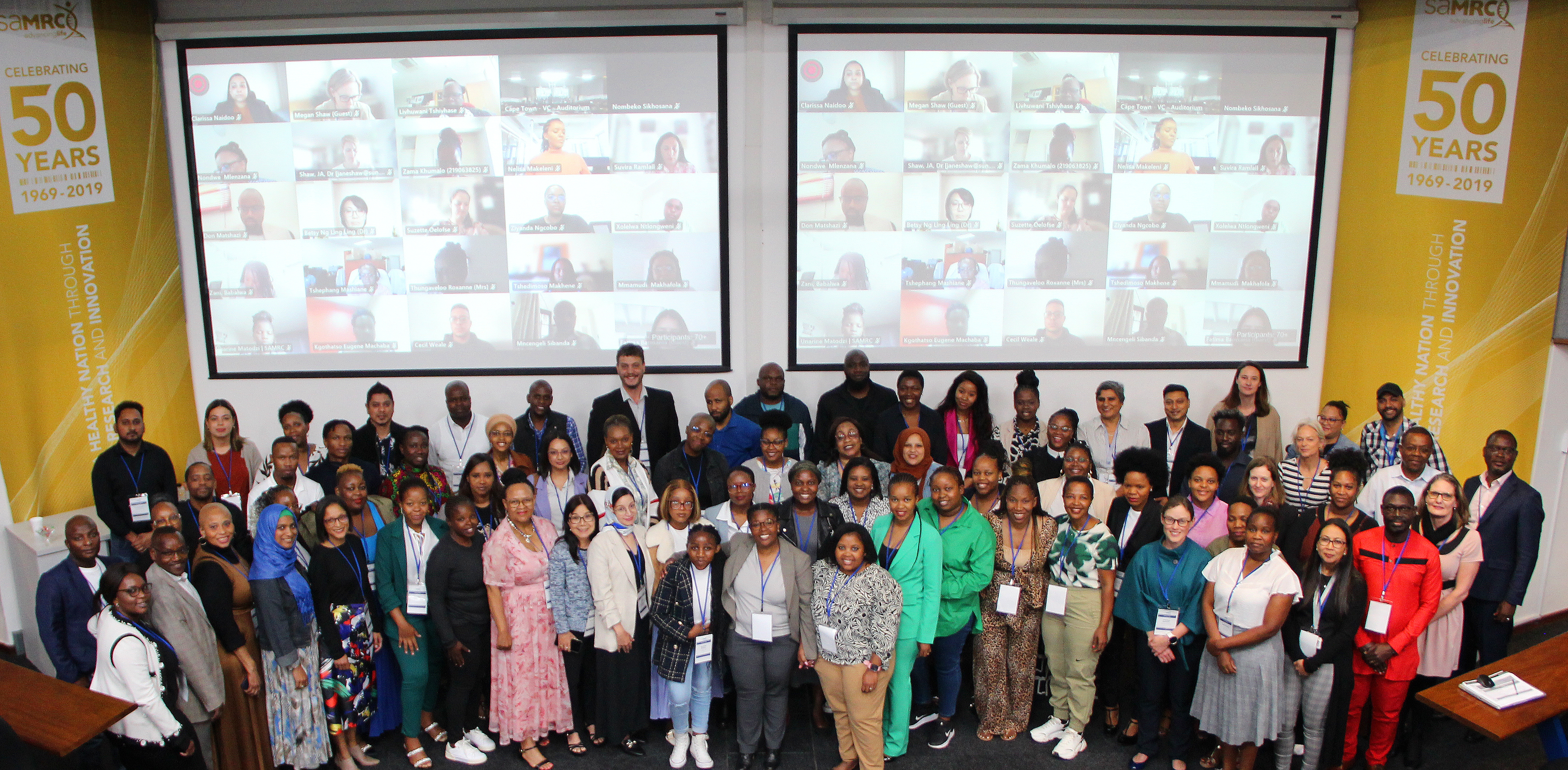The South African Medical Research Council (SAMRC), through its Research Capacity Development (RCD) division held its first RCD Beneficiary Conference from 20th to 21st of November 2023.
Bringing together over 170 grant and scholarship holders who are funded by RCD, the RCD Beneficiary Conference was in a hybrid format, with the in-person component hosted at the SAMRC Conference Centre (Cape Town). About 80 people attended in person, with over 100 online attendees. The theme of the conference was “Open Science for accelerating sustainable health research, collaboration, and partnerships”. This gathering aimed to provide an opportunity for networking and visibility for early-career and emerging researchers, foster collaborative discussions, and spotlight the progress achieved by these individuals.
The conference was opened by Dr. Abeda Dawood, RCD Division Manager, who warmly welcomed attendees and set the tone for an enriching experience. Following this, Prof. Eunice Seekoe, Chairperson of the SAMRC Board Research and Development Committee, shared a thoughtful message, emphasizing the significance of collaborative efforts to strengthen research capacity development and advance health research.
Dr Michelle Mulder, the Executive Director of Grants, Innovation, and Product Development (GIPD) and Research Capacity Development (RCD) provided a strategic overview of SAMRCs view on Open Science emphasising that the SAMRC supports resolutions in the draft national declaration on open access and that the SAMRC joined cOAlition S - a platform created for accelerating the transition to full and immediate Open Access to scientific publications.
Dr. Tshiamo Motshegwa, Director of the African Open Science Platform (AOSP), Strategy, Planning, and Partnerships (SPP) at the National Research Foundation delivered the opening keynote address, presenting on "Open Science for accelerating sustainable health research, collaboration, and partnerships." His insights prompted engaging discussions among the attendees, setting the stage for the event's diverse sessions.
Structured to cater to the specific needs of Mid-career, Early-career, and Emerging researchers, the conference featured sessions addressing both the technical aspects of science and non-technical skills required to navigate the evolving landscape of science and technology. Dr Caradee Wright, Chief Specialist Scientist of the Environment and Health Research Unit (SAMRC) delivered a plenary talk on "Major climate change-induced risks to human health in South Africa".
The skills were presented through masterclass format whose sessions were proposed by conference participants and these included; (1) Intersection of AI and Health Science, (2) Navigating you Career as a Researcher: How to establish networks for work opportunities, mentorship, collaborations, funding and fellowships, (3) Behind the scenes of health and clinical research: (4) Exploring key challenges faced by researchers and how to overcome them, (5) Developing a growth mind-set for work-life balance and (6) The Career Lounge: Beyond PhD, where to from here?
The event also featured a lunch session where current and past beneficiaries shared their firsthand accounts of the impact of RCD funding on their research endeavours and career development. This session highlighted how RCD has over the years contributed to building the South African health research capacity pipeline.
The conference also provided an opportunity to celebrate scholars who had completed their studies under RCD funding. Scholars who presented their work at the conference were eligible for prizes, with the best presentation awarded to Lihle Moyakhe from the University of Cape Town who presented on the Genetic and epigenetic associations with child development and mental health and the best abstract awarded to Bonginkosi Shabangu from the University of the Witwatersrand with an abstract entitled “Genomic characterization of Acinetobacter baumannii associated with neonatal sepsis and stillbirths in a South African population”..
In her concluding remarks, Dr. Abeda Dawood, RCD division manager, stated, "This conference is more than just a gathering; it's a testament to the collective strength of our research community. The insightful and robust discussions and shared experiences amplify the impact of RCD funding, supporting the tangible outcomes that result from strategic investment in research and capacity development."
The success of this first combined conference after the COVID-19, is a reflection of RCD's commitment to fostering a vibrant and interconnected research community. The stories shared, lessons learned, and connections created during these two days serve as a testament to the instrumental role played by the RCD in determining the trajectory of medical research in South Africa.
Current and past beneficiaries share their firsthand accounts of the impact of RCD funding on their research endeavours and career development.
See moments from the RCD beneficiary event | HERE
Contributors: Research Capacity Development Division (abeda.dawood@mrc.ac.za)

